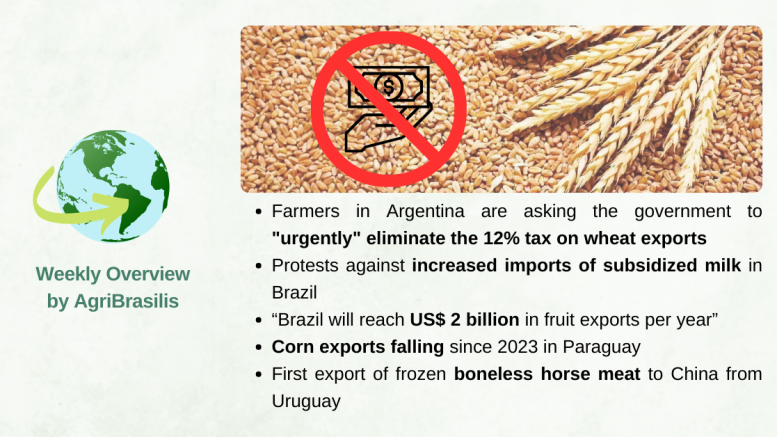Farmers in Argentina are asking the government to “urgently” eliminate the 12% tax on wheat exports

Farmers are asking the government to “urgently” eliminate the 12% tax on wheat exports. According to them, wheat prices barely cover production costs in the 2024/25 season. Argentina is one of the world’s main wheat exporters, but, according to the Buenos Aires Grain Exchange, the area sown in the 2024/25 season will be below the average of the last five years due to low profitability. “We ask the authorities to urgently review these policies and work on implementing measures that promote an environment that motivates the development of wheat farming, with the elimination of export tariffs being the first of these measures”, according to a statement from the Argentine Rural Confederations. (Buenos Aires Cereal Exchange; CRA)
Raízen plans to invest US$ 600 million over the next four years to modernize its refinery in Argentina, according to Diana Mondino, Argentine Foreign Affairs Minister. Raízen executives met with the Minister in Brazil. According to Mondino, the company is interested in increasing the participation of Argentina and Brazil in the global biofuels market. (Ministry of Foreign Affairs)
Presence of the corn leafhopper (Dalbulus maidis) is alerting researchers due to the possible infection of plants by the bacteria Spiroplasma kunkelii, transmitted by the insect. The bacteria causes a disease known as corn sturn. “It’s a disease that affects the physiology and nutrition of the plant”, said Karina Torrico, specialist at the National Institute of Agricultural Technology – INTA. “It is notable how, in recent years, in hot areas this manifests itself with early infections when corn cultivars are susceptible”, said Giménez Pecci, also a specialist at INTA. Many corn crops in the Northern region are classified as in “poor conditions”, with damage caused by pale stunting. The pathogen also occurs occasionally in areas north of Santa Fé, Santiago del Estero, Chaco and Córdoba. Losses caused by the corn leafhopper were estimated at US$ 1.3 billion in the 2023/24 season. (INTA)
Strong decrease in cattle slaughter in March, with a drop of more than 18%, the worst result for the month in 45 years. For the 1Q/2024, 3.27 million cattle were slaughtered, a drop of 7.8% when compared to the same period of 2023. (Consortium of Argentine Meat Exporters)

The Parliamentary Front for Agriculture held a meeting on April 16th to discuss land invasions in Brazil. Between April 14th and 15th, the Landless Workers Movement carried out more than 20 invasions, in 11 States, in addition to other coordinated actions, such as the occupation of the National Institute of Colonization and Agrarian Reform – Incra in the State of Santa Catarina. In the early hours of April 14th, Embrapa Semiárido (Embrapa Semiarid Unit) had two areas occupied in experimental fields by the Movement. (FPA; Embrapa)
Agribusiness exports from the State of Minas Gerais reached a new record in the 1Q/2024. Total value of international sales reached US$ 3.4 billion, an increase of 5.1% when compared to the same period of last year. Total volume was 3.3 million tonnes, a growth of 4.4% compared to the 1Q/2023. (Seapa)
Soybean sales have reached only 45% of the capacity expected for this year. The country has sold around 68.5 million tonnes of the 2023/24 harvest, which represents a delay when compared to previous years. Slowdown in sales raises concerns about logistical risks that may arise in the 2H of the year. Low sales, combined with the entry of off-season corn after mid-May, will result in an even greater concentration of the harvest’s flow. This could put pressure on warehouses that already lack capacity, in addition to putting pressure on the logistics chain and increasing costs for farmers. According to Felipe Jordy, intelligence leader at Biond Agro, a specialist in agribusiness analysis, the storage deficit is one of the main challenges faced by agribusiness. (Biond Agro)
2023/24 sugarcane harvest has reached 713.2 million tonnes, setting a new record for the sector, mainly in terms of productivity increases. (Conab)
Protests against increased imports of subsidized milk, mainly from Argentina, are being promoted by the Brazilian Confederation of Agriculture and Livestock, with support from the Federation of Agriculture and Livestock of the State of Santa Catarina – Faesc. President of Faesc, José Zeferino Pedrozo, says the problems that the milk production chain has faced – including excessive imports – make it necessary to develop a new public policy for the development of the sector, prioritizing locally produced inputs. (Faesc; CNA)
“Brazil will reach US$ 2 billion in fruit exports per year, and this value should come in the next three years, or at most four”, according to Guilherme Coelho, president of the Brazilian Exporters Association of Fruits and Fruit Products. “The demand for fruit in the world continues to grow. We have recently opened the avocado, tangerine and lime market to India, which has 1.4 billion people.We will open the grape market in China as well”. (Abrafrutas)
Agribusiness in the State of Goiás employed more than 1 million people in 2023, reaching the highest level in 11 years, according to the Bulletin on the Agribusiness Labor Market in Goiás State, released by the Mauro Borges Institute. This corresponds to 26.6% of the total number of employed people in the State and represents a growth of 2.4% when compared to 2022. (IMB)


In February, specimens of fruit flies (Ceratis capitata) were identified in Coquimbo. Furthermore, in La Huayca, Tarapacá region, occurrences of the insect were also recorded at the beginning of April. Quarantines were carried out in these areas, to prevent the fly from re-establishing itself as endemic in the country. Chile was declared free of fruit flies in 1995. The reintroduction of the species could generate major losses for agriculture, and the country would lose its status as the only one free of this pest on the continent. (SAG)
There should be a better performance for the apple sector in Chile, after positive results in the 2022/23 season, according to Maximiliano Bustamante, from MBAsesorias, apple market consultant. However, Peru has announced the suspension of imports of stone fruits and apples from Chile due to the possibility of the entry of the quarantine pest Grapholita molesta. The suspension occurred after recurring detections of the insect’s presence at points of entry into Peru. (Midagri; MBAsesorias)

Avocado prices increased 60% last year. In March, the prices per kg of Hass and Lorena avocados increased by 72% and 60%, respectively. According to the Hass Avocado Farmers and Exporters Corporation of Colombia, there was a decrease in the supply of the fruit, due to the impacts of El Niño. There was a 44.7% drop in exports in February, compared to the same period in 2023. (Corpohass)


Corn exports have continued to fall since 2023, and generated 50% less foreign exchange for the country. Until March, Paraguay exported 290.2 thousand tonnes of corn, which represented a drop of 34.4% compared to the 442.1 thousand tonnes shipped in the same period of 2023. (Central Bank of Paraguay)
Central Bank maintains the growth estimate of 3.8%, but there should be a poor performance of the agricultural sector. According to the Central Bank, weather conditions have harmed crop yields, and growth in the agricultural sector was revised from 4.2% to 2%. (Central Bank of Paraguay)
Soybean harvest should reach a record, but exporters are concerned about low river levels, which are delaying shipments along the Paraguay – Paraná waterway. “Low rivers mean that ships cannot carry as much cargo, which delays the entire process”, said Sonia Tomassone, foreign trade advisor at Capeco. “It’s a good volume [of soybeans], despite the delays”, according to Tomassone. (Paraguayan Chamber of Oilseeds and Cereals Exporters)

First export of frozen and boneless horse meat to China was made. “We are very pleased with this shipment, and we are sure that it will be the first of many”, said the minister of agriculture, Fernando Mattos. The Chinese ambassador to Uruguay, Huang Yazhong, participated in the first shipment. “This event represents a significant step in strengthening our countries’ economic and trade relations”, said Yazhong. (Ministry of Agriculture)

READ MORE:

